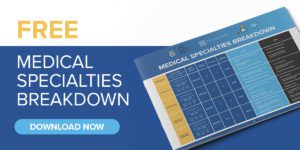How to Choose a Medical Specialty: The Ultimate Guide
- by
- Oct 20, 2022
- Reviewed by: Amy Rontal, MD

Some future physicians enter medical school intent on a certain specialty, but most are uncertain or change their minds altogether. The decision is a difficult and important one. After all, this choice made in your 20s or 30s will be one that shapes your day-to-day life for the next three decades. Given that impact, it can feel similar to choosing a partner to marry or deciding where to buy a home.
Unfortunately for most medical students, your “courtship” with a certain specialty during medical school is just a few weeks of rotations. If you want to explore a specialty that isn’t part of the traditional core curriculum such as anesthesiology, emergency medicine, or a surgical subspecialty, you must blaze your own path and squeeze it into a third-year elective. Of course, you’ll have more elective months in your fourth year, but by this time you’ll have long submitted your residency application!
If you’re feeling overwhelmed by this situation, you’re not alone. Many students find themselves dual applying to specialties, hoping to decide along the interview trail which specialty feels right. Others change their mind a month before ERAS is due. If you’re like me, you did both! Having been in this stressful situation myself not too long ago, I’m hoping my tips below can help you navigate this decision. A good place to start is to ask yourself these questions.
Looking for more of a clear breakdown and side-by-side comparison of each medical specialty? Find your path in medicine with the FREE Medical Specialties Breakdown Guide! Go beyond the data with qualitative insights from residents, practicing physicians, and med school tutors who have been in your shoes.
Questions to Consider When Choosing a Medical Specialty
1. Does my career path offer the flexibility that I want?
A minority of medical students know they want something very specific, like being an orthopedic surgeon who specializes in treating carpal tunnel. If you’re reading this article, chances are that you don’t have your heart set on a very specific future practice. In that case, I recommend finding out if the career paths you’re interested in offer flexibility throughout your career so that as your interests or family life change, so can your daily work. You may want to check out this article, “Which Specialty is Best for Work-Life Balance?” if your work-life balance is a primary focus when choosing a specialty.
I chose internal medicine in large part because the breadth of the field offered me countless options for future practice. I appreciate the acuity level, which ranges from outpatient visits to the ICU. I can do procedures as a gastroenterologist or a cardiologist or I can do more interpretive work as an endocrinologist or nephrologist. I can have lifelong continuity of care with my patients or interact with them briefly as a hospitalist or intensivist. The demand for general internists in many specialties remains high as the population ages, meaning I will have leverage in salary and work-hour negotiations. This also means I can work anywhere in the country, which is important to me as my family life changes over the course of my career.
Since I don’t have a clear picture of what I want my day-to-day to look like, I found comfort in choosing something very broad and flexible. You may not feel the same. You may want to be a reconstructive urologist even if that means you can’t find a job in a saturated market like NYC. You may love neurology and are very comfortable closing the door on being a proceduralist. You may be very willing to completely give up long-term relationships with your patients as an emergency room physician. No matter where you fall, I strongly encourage you to decide which factors matter to you, and what careers align with those values.
To summarize, here is a good list of job flexibility criteria to consider. Remember that many specialties offer a mix of these attributes rather than a straight dichotomy!
- 1. Acuity level
- 2. Proceduralist vs. not procedural
- 3. Continuity of care vs. brief interactions
- 4. Inpatient vs. outpatient
- 5. Geographical flexibility
- 6. Job demand/outlook
- 7. Flexibility in hours
- 8. The ability to change throughout your career
- 9. Academic vs. private practice
- 10. Work-life balance
2. Does this career pique my academic interests?
This seems obvious. Why would you choose a specialty that you aren’t interested in? I don’t think it’s as simple as it seems, however. We become interested in specialties for all different reasons, including the influence of strong role models. For most of my third year, I thought I would become a pediatrician because all my mentors were pediatricians, and they were so passionate and energetic about what they did. When I started doing pediatric rotations with other attendings, however, my enthusiasm started to wane. I was feeling frustrated and unfulfilled at the end of each day. It just didn’t feel right.
As a tutor, I internally groaned when students wanted help preparing for the pediatrics shelf exam because those were my least favorite questions to teach. Meanwhile, I remembered my enthusiasm as a second-year student studying for our “heart, lung, kidney” unit which, in retrospect, is “bread and butter” internal medicine. I had been on the fence between the two specialties until I really reflected on my true intentions to become a pediatrician. I realized that while my mentors loved pediatrics, my academic interests and the patients I wanted to care for aligned with internal medicine.
Once I switched gears, I found internist mentors who were just as excited about their work as pediatricians. My advice to you is to truly examine why you like a specialty. Is it just because you love the attending you worked with during your rotation, or is it because you love the work itself? I am not discounting the fact that you should jive well with your colleagues within your chosen specialty. But be careful not to fall into a specific specialty solely because of a particularly charismatic mentor.
You should consider careers where you could see yourself intellectually engaged in the work for many years. That could mean a specialty exploding with new innovative surgeries or cutting-edge biologics. However, many physicians are involved at a deeper level than just direct patient care, and you should ask your mentors what other opportunities are available. Cast a wide net! This could include areas to work in advocacy or public policy, global health, community outreach, interdisciplinary programs, medical education and teaching, research, or even opportunities to engage with business enterprises or industry.
3. Do I understand the work?
Like my last piece of advice, this one may not seem very complicated on the surface. Ideally, you’ve spent at minimum a few weeks rotating through the specialty you apply into. Do keep in mind that at most medical schools, you are only seeing academic medicine. There are entire models of healthcare we are seldom exposed to as medical students, including private practice, direct primary care, VA and military medicine, rural medicine, international medicine (Red Cross, Doctors without Borders), and mixed practice. There’s also a lot more flexibility in most fields than you probably realize as a medical student.
While on the rotations, I also discovered that many of the “generalists” I encountered often had a specific niche within their practice. For example, one physician had always had an interest in gender diversity and mental health. While she had loved her psychiatry rotation in medical school, her calling was in general pediatrics. Within this broad field, she was able to build a practice over the years that incorporated these interests. Thus, a large portion of her panel is now composed of LGBTQ+ patients who depend on her for front-line management of their mental health. Another physician had always loved pediatrics and global health. He decided to pursue pediatric ER medicine, which gave him the skills to be highly useful in low-resource settings as well as work a shift schedule compatible with frequent travel. The point here is that if you are interested in multiple subjects, consider how a certain specialty may be able to accommodate all of those interests or career goals.
Finally, perhaps the best piece of advice: don’t pay attention to the residents. While undeniably difficult and stressful, residency is finite. Even a 5-year residency makes up only 16% of a 30-year career. If you’re discouraged by the amount of note-writing and small tasks you see the intern performing, take a break from the residency workroom and consider if the attending is doing work that appeals to you. (Remember: if the resident is doing something, that means the attending doesn’t have to! Think discharge summaries, orders, consults, nursing pages, care coordination, etc.). Once rounding or surgeries are done for the day, the attending has likely left the resident team to complete these tasks while they go on to do something more exciting, like research, mentoring, teaching, curriculum-writing… or going home for the day.
In the private practice setting, many physicians have scribes or use dictation software to make their days more efficient. Additionally, they have social workers to optimize care access, pharmacy teams to help with prior authorizations and cost barriers, and nurses who screen and respond to messages so the physician is practicing at the top of their license. Medical students who have only spent time in free clinics may not realize how different the workflow is for a private practice physician. Learn about the different models of practice for the specialty you’re interested in because I guarantee there are more ways to practice than what you’ve seen as a medical student!
4. Is my salary more important to me than other lifestyle factors?
Salary and “lifestyle” are oft-cited reasons to pick a certain specialty, and they are very important considerations! But proceed with caution. As I emphasized above, there is tremendous variation even within the same specialty. Acuity level, procedural volume, call burden, geography, market demand, job opportunities (i.e. private vs academic), and many, many more factors influence both pay and lifestyle of any given physician. Even something as simple as understanding how to accurately bill patient visits can result in a significant pay differential between physicians doing the same work.
I advise starting with the type of patients you like working with and what area of medicine is academically stimulating to you. From that foundation, you can decide if your desired specialty has jobs within it that offer the type of lifestyle and salary you are seeking. As pointed out in several articles by the White Coat Investor, the “intra-specialty salary difference is greater than the inter-specialty salary difference.” This means that on average, the range of income between emergency physicians is greater than the range between emergency physicians and family medicine doctors. These differences are often driven by location and practice model (with private physicians earning more than academics) but many levers can be pulled to raise your income in each field.
While an interesting guide, keep in mind that the yearly Medscape Compensation Report is not a binding document that describes immutable earning potential for any given specialist. Your income is not static! For example, gaining new procedural skills, utilizing APPs, improving documentation, or expanding services offered at your clinic can drastically boost income within the confines of the same specialty. Find what you like to do and what you think might be rewarding work for you over several decades. As the White Coat Investor points out, you will earn more money in the long run by choosing a lower-paid position you can enjoy for a career rather than a more lucrative one that will burn you out in a few years’ time. Over the course of your career, continue to seek opportunities to increase profitability as well as carve out your ideal lifestyle.
5. Am I competitive in this field?
While a difficult topic, this is something you need to take into serious consideration. Residency programs increasingly care about applicant extracurriculars and personal motivations, but they haven’t forgotten about those pesky exam grades. Many schools grade on a pass-fail system so programs must rely on Step scores as a standardized measure of academic performance. After all, they don’t want to match an intern class which may jeopardize their board pass rates. No matter your thoughts on the constantly evolving landscape of standardized tests and medical education, achieving good grades can only benefit you during application season. (Although if you’d like to take a study break to dive into some thought-provoking articles on medical education, I highly recommend reading some articles by the Sheriff of Sodium).
All medical students struggle with the sheer amount of information they are consuming during the first semester of medical school. However, by the next semester, you should be hitting your stride with a study method that is much more efficient and effective. If you’re still struggling several months into school, you should seek out a tutor to get you on track. A personal med school tutor can help you create a balanced study schedule that focuses on active learning. (Hint: it’s a lot of questions, and not a lot of dozing off during videos at 3x speed!). They can set you up with study tools like the Cram Fighter study planner software which allows you to aggregate all the resources you’re using into a highly organized daily study schedule.
Tutors can also offer one-on-one sessions to review questions together and diagnose common test-taking pitfalls like anchoring, 50-50s, timing issues, burnout, and test anxiety. I sought out a tutor when I was struggling to keep up in the anatomy lab. I found that weekly practice sessions with my tutor kept me accountable and on a reliable schedule. My tutor also helped me to focus on the important concepts, especially the “high yield” material which felt very hard to differentiate from superfluous detail as a brand-new medical student! Now as a tutor myself, I find it rewarding to teach these valuable lessons early on in a student’s career.
Pitfalls to Avoid When Choosing a Medical Specialty
(The following “pitfalls” section was written by Med School Tutors.)
Now that we’ve covered the important factors to consider when choosing a medical specialty or residency program, let’s dive into the common pitfalls you may encounter on the road to residency. Below, we explore some of the most prevalent mental, emotional, and social traps you should avoid when choosing your medical specialty.
1. Peer pressure
In medical school, you’re surrounded by stories of trauma and sleep deprivation. In fact, it becomes one of the metrics by which social status is achieved. There are specialties that bring you additional social status such as surgery and internal medicine. It’s common to hear these same specialties referred to as “real” residencies by those who consider these fields to be more challenging than others. You spend your medical school career with the mindset of pleasing people, from the residents on service to attendings from whom you hope to receive letters of recommendation. It is easy to forget to reflect internally on what will make you happy, especially when it may not gain the desired response from those around you.
2. Ignoring quality of life
It’s taboo in medical school to say you are not interested in a specialty because of the hours or volume of work. It is easy to lose sight of what we embarked on this career to achieve: helping patients. Even if you are naturally gifted in a specialty, if you end up resenting your job, you will not be a strong healthcare provider. At 3 a.m., when you’re admitting a patient to the hospital or removing an appendix, you have to be completely invested in your patient without a strong urgency to simply complete the task and be relieved of your duties. It’s good to know your strengths, but even more important to be honest with yourself about what will make you happy. A happy and passionate provider is what every patient deserves.
3. Forgetting the “bread and butter”
As medical students, we’re often diverted toward the “zebra” cases and away from the “bread and butter.” This is great for solidifying obscure information that would be tested on the USMLE exams and is much more interesting than the ninth case of influenza. However, it’s a dangerous practice because you aren’t exposed to what the specialty honestly looks like as an attending. It’s easy to fall in love with a particular niche within a specialty and lose sight of what your actual day-to-day life will look like. To find job satisfaction, you should pick a specialty where you like the “horses” too, because that is what you will spend the vast majority of your career treating.
4. Ignoring your gut
Most medical students have two or three specialties they’re trying to pick between. As scientific-minded people, we’re trained to rely on data for all decisions. Thus, people make lists and devise scoring methods to decide between specialties. But in reality, you can’t make this decision with numbers. No algorithm will be able to appropriately incorporate your passion for a field of medicine.
If you put aside the numbers—and, perhaps more importantly, other people’s opinions—you’ll more likely than not find that you already know what you’re leaning toward. In all reality, more medical students aren’t exposed to enough specialties or subspecialties for a long enough period of time to make a definitive decision about how they would like to spend the rest of their lives. The best option is to tune out the noise, trust yourself, and follow your gut.
5. Being afraid to change your mind
Changing specialties after you have been working for years to tailor an application for a specific specialty can feel daunting and impossible. It’s also easy to feel like you will disappoint your mentors when you change specialties during residency or even afterward. However, at the end of the day, all they really want is for you to be happy and it’s their job to guide you down the right path. Medicine is a demanding career and you’re likely going to practice for a long time, so delaying your path by a few years is a small price to pay for enjoying the next 30 years of your life.
In Conclusion
Overall, medicine is a very wide, constantly-evolving field. Your opportunities are many, which is why this decision can feel so daunting. The more you explore a given specialty, the more you realize the decision is not as permanent as you think. That’s a good thing! It means you have the flexibility to pivot throughout your career as your interests and personal life change. Take another swig of coffee…proofread ERAS one more time…take a deep breath…and hit submit!
Further Reading
About the Author
I'm originally from the Northeast but attended college and medical school in Virginia. I just started residency in Internal Medicine this past year and am enjoying tutoring with Blueprint in my free time! I have always felt drawn to mentoring, especially when it comes to helping students like me who have no family in medicine to guide them. Now as a tutor at Blueprint, I’ve spent hundreds of hours teaching students at all levels. I think a lot about medical education and am excited to share my reflections on all things medical school and residency. In practice, I enjoy general medicine and as a bilingual physician find it especially rewarding to care for Spanish-speaking patients. When I’m not in the hospital, I enjoy salsa & bachata dancing, traveling to South America, dogs, and spicy food.










